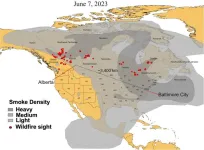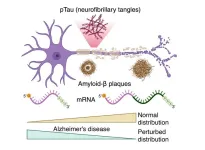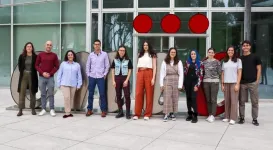(Press-News.org) Wildfire smoke has long been known to exacerbate health problems like heart disease, lung conditions, and asthma, but now a new study finds that smoke from these fires can lead to poor health thousands of miles away. Researchers from the University of Maryland Institute for Health Computing (UM-IHC) found that medical visits for heart and lung problems rose by nearly 20 percent during six days in June, 2023, when smoke from Western Canadian wildfires drifted across the country, leading to very poor air quality days in Baltimore and the surrounding region.
The new findings were published today in the journal JAMA Network Open.
During the summer of 2023, severe Canadian wildfires created a vast plume that drifted 2000 miles across the country, leading to poor air quality on the East Coast of the United States, and many individuals experiencing breathing issues that led them to the doctor’s office.
“Baltimore had very dark skies, and we could all smell the smoke in the air,” said Mary Maldarelli, MD, pulmonary critical care fellow at the University of Maryland School of Medicine (UMSOM) who is the first author on the study. “But most importantly, my patients came in to me saying they were coughing quite a bit more and needed their medications more often, so they felt much sicker than they usually did when these wildfires occurred.” Dr. Maldarelli is also a resident in Pulmonary and Critical Care Medicine at the University of Maryland Medical Center.
To determine whether the smoke-filled days led to quantifiable health consequences, she partnered with data scientists and visualization experts at the UM-IHC, which has access to nearly 2 million de-identified patient records from the University of Maryland Medical System (UMMS).
The researchers analyzed satellite data and Environmental Protection Agency (EPA) data to identify six “hotspot” days in June 2023 with high levels of wildfire smoke-related air pollution in the Maryland area. These were days that exceeded the EPA’s standards for safe air quality in all 23 counties in Maryland.
The team then culled through the de-identified electronic health records from UMMS, comparing medical visits for heart-lung or cardiopulmonary conditions from June 2023 with medical visits during June 2018 and June 2019. These included emergency department visits, hospital admissions, and outpatient clinic visits.
“We found that hotspot days were associated with an 18 percent increased likelihood of patients going to the doctor for complications related to a cardiopulmonary condition,” said study corresponding author Bradley Maron, MD, Professor of Medicine at UMSOM and Co-Executive Director of the UM-IHC. “We also found a 55 percent increase in the risk for an outpatient visit for heart and lung conditions; these patients tended to be older, non-smokers, and more socio-economically affluent than typical patients who see their doctors for cardiovascular conditions on good air quality days.”
That finding could highlight the importance of healthcare access and may indicate that more economically disadvantaged patients are not getting the medical care they need on high-risk days filled with wildfire smoke.
With more climate events expected in the future, doctors may require better tools to help disadvantaged patients on hotspot days.
“We have the opportunity to leverage the capabilities of the UM-IHC to proactively identify patients who are most at risk and provide them with anticipatory care,” said UMSOM Dean Mark T. Gladwin, MD, who is the John Z. and Akiko K. Bowers Distinguished Professor and vice president for medical affairs at the University of Maryland, Baltimore. “There may be crucial ways we can prevent cardiovascular complications on polluted smoke air days simply by providing them with telehealth visits or other ways to access care.”
Amir Sapkota, PhD, and Hyeonjin Song, PhD, of the University of Maryland School of Public Health, performed the satellite and EPA analyses for the study. Study co-authors also included faculty from the University of Maryland, College Park, the University of Maryland School of Pharmacy, and the University of Maryland Medical System.
“Being able to access clinical data at a granular level and our ability to apply advanced analytical tools such as this is critical and essential to the future of health care and enables UMMS to be at the forefront of innovative medicine that will help drive patient care in the years ahead,” said study co-author Warren D’Souza, PhD, Co-Director of the UM-IHC and Senior Vice President/Chief Innovation Officer at UMMS.
Funding for the study was provided by Montgomery County, Maryland, and The University of Maryland Strategic Partnership: MPowering the State, a formal collaboration between the University of Maryland, College Park and the University of Maryland, Baltimore.
END
Exposure to remote wildfire smoke drifting across the US linked to increased medical visits for heart and lung problems
New study found increased medical visits for heart and respiratory problems in Baltimore on poor air quality days from western Canadian wildfires
2024-12-13
ELSE PRESS RELEASES FROM THIS DATE:
Northwestern University joins Giant Magellan Telescope International Consortium
2024-12-13
PASADENA, CA – December 13, 2024 – The Giant Magellan Telescope announced today that Northwestern University has joined its international consortium to construct the $2.54 billion observatory.
Home to the world-renowned Center for Interdisciplinary Exploration and Research in Astrophysics (CIERA) and the newly founded NSF-Simons AI Institute for the Sky (SkAI), Northwestern is at the forefront of advancing astrophysical research. Northwestern researchers will develop and apply cutting-edge artificial intelligence ...
HR-positive, HER2-negative breast cancer patients with high risk of recurrence may benefit from addition of anthracyclines to taxane- based chemotherapy
2024-12-13
SAN ANTONIO – Patients with early-stage, node-negative, hormone receptor (HR)-positive, HER2- negative breast cancer who have a high risk of recurrence based on the OncotypeDX genomic test had better outcomes when treated with adjuvant anthracycline- plus taxane-based chemotherapy regimens compared with those receiving adjuvant taxane-based chemotherapy regimens alone, according to results presented at the San Antonio Breast Cancer Symposium (SABCS), held December 10-13, 2024.
“HR-positive, HER2-negative is the most common type of breast cancer in the United States and we frequently need to decide whether or not adjuvant chemotherapy ...
ZEST trial offers insights for using ctDNA to predict breast cancer recurrence
2024-12-13
SAN ANTONIO – The ZEST clinical trial, designed to evaluate niraparib (Zejula) for the prevention of breast cancer recurrence in patients with circulating tumor DNA (ctDNA), failed to accrue enough patients positive for ctDNA, according to results presented at the San Antonio Breast Cancer Symposium (SABCS), held December 10-13, 2024.
As some of the lessons learned from this trial, investigators suggest beginning ctDNA testing during treatment rather than waiting for treatment completion as done in ZEST, and including patients with high- risk ...
Multimodal machine learning model effective at predicting response to CDK4/6 inhibitors in HR-positive, HER2-negative breast cancer patients
2024-12-13
SAN ANTONIO – A machine learning (ML) model incorporating both clinical and genomic factors outperformed models based solely on either clinical or genomic data in predicting which patients with hormone receptor (HR)-positive, HER2-negative metastatic breast cancer would have better outcomes from adding CDK4/6 inhibitors to endocrine therapy as first-line treatment, according to results presented at the San Antonio Breast Cancer Symposium (SABCS), held December 10-13, 2024.
While the use of CDK4/6 inhibitors combined with endocrine therapy have significantly improved outcomes in patients with HR-positive, ...
Light-induced gene therapy disables cancer cells’ energy center
2024-12-13
COLUMBUS, Ohio – Researchers are shining a light on cancer cells’ energy centers – literally – to damage these power sources and trigger widespread cancer cell death.
In a new study, scientists combined strategies to deliver energy-disrupting gene therapy using nanoparticles manufactured to zero in only on cancer cells. Experiments showed the targeted therapy is effective at shrinking glioblastoma brain tumors and aggressive breast cancer tumors in mice.
The research team overcame a significant challenge to break ...
MLB adds lifesavers to the chain of survival at annual Winter Meetings
2024-12-13
DALLAS, December 13, 2024 — The American Heart Association and Major League Baseball (MLB) brought cardiopulmonary resuscitation (CPR) and automated external defibrillator (AED) training to the League’s annual Winter Meetings held in Dallas this week. Attendees from all 30 Major League Clubs and many organizations across the baseball industry learned lifesaving skills needed to respond confidently and capably in the event of a cardiac emergency.
According to American Heart Association data, 9 out of ...
TTUHSC researcher to study protein regulation in Alzheimer’s disease
2024-12-13
More than six million Americans are affected by Alzheimer’s disease, a form of dementia marked by accumulation of amyloid-β within the brain. Amyloid-β is a relatively small protein that forms toxic plaques in the brain contributing to the harmful effects of Alzheimer's disease. Another protein, hyperphosphorylated tau (pTau), also accumulates as toxic neurofibrillary tangles. Together, amyloid-β plaques and pTau tangles result in brain damage, neuroinflammation and ultimately brain death.
Gene expression studies have already identified ...
Oxidation in glacial rivers and lakes could help mitigate methane emissions
2024-12-13
(Carlisle, Pa.) — A new study in the journal Scientific Reports offers a rare glimmer of hope in the face of climate change, suggesting glacial rivers and lakes may play a crucial role in mitigating the effects of methane, a powerful greenhouse gas that recent studies have shown emerging as glaciers melt in warming global temperatures.
This new study, led by Dickinson College Associate Professor of Environmental Studies Kristin Strock, looked at what happens when glaciers melt and release trapped methane, a potent greenhouse gas that contributes to climate change. Strock, a 2019 National Geographic Explorer, led an all-female team of researchers ...
How chemical reactions deplete nutrients in plant-based drinks
2024-12-13
Over the last decade, the global market for plant-based beverages has seen remarkable growth, with oat, almond, soy and rice drinks emerging as popular alternatives to cow’s milk in coffee and oatmeal during this time.
One of the likely reasons for millions of liters of plant-based drinks ending up in the shopping baskets of consumers is that their climate footprint is often lower than that of cow’s milk. But consumers would be mistaken if they considered plant-based beverages healthier than cow’s milk. This is highlighted in a new study conducted by the University of Copenhagen in collaboration with the University ...
The CNIC presents iFlpMosaics, an innovative genetic toolkit for the study of gene function
2024-12-13
A team at the Centro Nacional de Investigaciones Cardiovasculares (CNIC) has developed a comprehensive set of innovative genetic tools and mouse lines, called iFlpMosaics, designed to enhance the study of gene function and its implications in health and disease.
The groundbreaking study, led by Dr. Rui Benedito and published in Nature Methods, presents a pioneering approach that overcomes critical limitations of existing methods for generating genetic mosaics. These innovations will enable scientists to more accurately investigate the effects of somatic mutations on cellular biology and disease.
The study highlights the iFlpMosaics toolkit's utility across different experimental setups, ...
LAST 30 PRESS RELEASES:
ASU researchers to lead AAAS panel on water insecurity in the United States
ASU professor Anne Stone to present at AAAS Conference in Phoenix on ancient origins of modern disease
Proposals for exploring viruses and skin as the next experimental quantum frontiers share US$30,000 science award
ASU researchers showcase scalable tech solutions for older adults living alone with cognitive decline at AAAS 2026
Scientists identify smooth regional trends in fruit fly survival strategies
Antipathy toward snakes? Your parents likely talked you into that at an early age
Sylvester Cancer Tip Sheet for Feb. 2026
Online exposure to medical misinformation concentrated among older adults
Telehealth improves access to genetic services for adult survivors of childhood cancers
Outdated mortality benchmarks risk missing early signs of famine and delay recognizing mass starvation
Newly discovered bacterium converts carbon dioxide into chemicals using electricity
Flipping and reversing mini-proteins could improve disease treatment
Scientists reveal major hidden source of atmospheric nitrogen pollution in fragile lake basin
Biochar emerges as a powerful tool for soil carbon neutrality and climate mitigation
Tiny cell messengers show big promise for safer protein and gene delivery
AMS releases statement regarding the decision to rescind EPA’s 2009 Endangerment Finding
Parents’ alcohol and drug use influences their children’s consumption, research shows
Modular assembly of chiral nitrogen-bridged rings achieved by palladium-catalyzed diastereoselective and enantioselective cascade cyclization reactions
Promoting civic engagement
AMS Science Preview: Hurricane slowdown, school snow days
Deforestation in the Amazon raises the surface temperature by 3 °C during the dry season
Model more accurately maps the impact of frost on corn crops
How did humans develop sharp vision? Lab-grown retinas show likely answer
Sour grapes? Taste, experience of sour foods depends on individual consumer
At AAAS, professor Krystal Tsosie argues the future of science must be Indigenous-led
From the lab to the living room: Decoding Parkinson’s patients movements in the real world
Research advances in porous materials, as highlighted in the 2025 Nobel Prize in Chemistry
Sally C. Morton, executive vice president of ASU Knowledge Enterprise, presents a bold and practical framework for moving research from discovery to real-world impact
Biochemical parameters in patients with diabetic nephropathy versus individuals with diabetes alone, non-diabetic nephropathy, and healthy controls
Muscular strength and mortality in women ages 63 to 99
[Press-News.org] Exposure to remote wildfire smoke drifting across the US linked to increased medical visits for heart and lung problemsNew study found increased medical visits for heart and respiratory problems in Baltimore on poor air quality days from western Canadian wildfires




